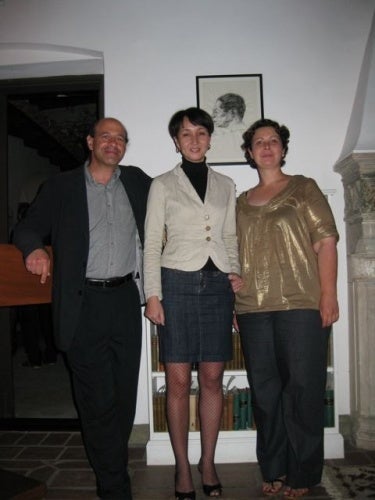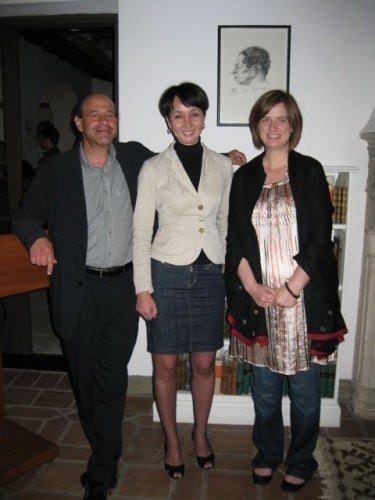
Villa Aurora program director Daniel Rothman, Galima Bukharbaeva, and Michaela Ullmann of the Feuchtwanger Memorial Library

Rothman, Bukharbaeva, and Carola Donnerhak, director of Villa Aurora
The 2009 Feuchtwanger Fellow spoke about the repression of journalists in Uzbekistan on May 20 at Villa Aurora. Daniel Rothman of Villa Aurora shared his account of the welcoming reception:
Traditional Uzbek music (performed by Monâjât Yultchieva) greeted attendees between 7:00 and 8:00 p.m. Galima spoke for approximately one hour, covering her early impulses and expectations about becoming a journalist in Uzbekistan; the journalistic limitations imposed by the dictatorship of Islam Karimov and the state-controlled press; and how the unfolding events of the Andijan massacre unexpectedly influenced her (and her husband Marcus Bensmann) to become activist journalists.
After a brief introduction to Uzbekistan's geographical relationship to its Central Asian neighbors, the region’s strategic importance, and its relative economic independence, Galima explained the circumstances leading up to the Uzbek government’s military response to a peaceful public outcry over the arrest of its citizens. With graphic photographs, Galima showed Uzbek armed forces firing upon its own citizens and the aftermath of that massacre, which caused a humanitarian crisis with refugees fleeing over a hostile border to Kyrgystan.
Covering Uzbekistan as an independent journalist is illegal, Galima said, and many of her friends and colleagues have been arrested, tortured, and killed. She mentioned Alisher Saipov (killed October 2007), Djamshid Karimov (nephew of Islam Karimov, incarcerated in a mental institution); and Salijon Abdurakhmanov (imprisoned), showing photographs of victims who had been tortured by Karimov's regime.
Human rights violations are endemic in all areas of Uzbek society, from the repression of religious freedom to abusive child labor practices in Uzbekistan’s cotton-based economy. In contrast to the oppression of Uzbek citizens, Karimov and his daughters—who are UN diplomats (serving on the organization's Human Rights Commission) in Geneva—lead an ostentatious lifestyle associated with Western movie stars and political figures. This, Galima explained, complicates and compromises the West’s ability to address human rights issues in Uzbekistan.
Galima's presentation concluded with questions from the audience and examples of independent news sources online, such as her own https://uznews.uz/ and the Institute for War and Peace Reporting.
In partnership with the Feuchtwanger Memorial Library, Villa Aurora awards the fellowship each year to writers who face exile or persecution in their home countries. Bukharbaeva will speak at USC this fall. Stay tuned for details.